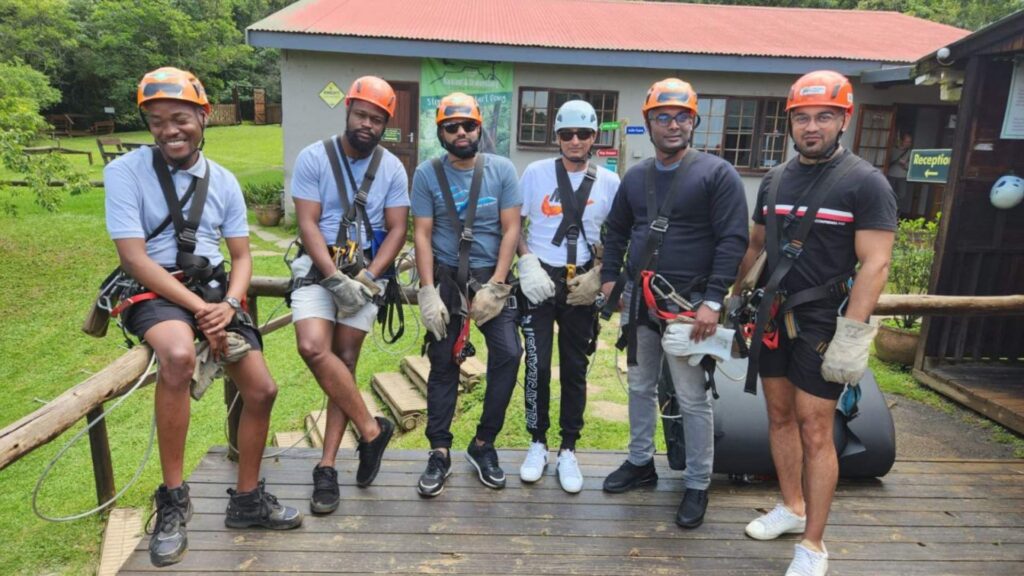Building an effective team is the backbone of business success in 2025. Whether you’re running a startup in Cape Town or leading a department in a large Johannesburg-based firm, how your team works together can either drive your goals forward—or hold you back.
Key Takeaways in Building an Effective Team
- Continuous learning and team-building activities sustain long-term team success – Investing in development and relationships keeps teams motivated and connected.
- Clear goals and shared purpose are the foundation of effective team building – Teams perform better when they understand the “why” behind their work.
- Emotional intelligence and psychological safety are non-negotiable for modern leadership – Teams thrive when they feel understood, respected, and safe to contribute.
- Open, regular communication is critical—especially for remote and hybrid teams – Keeping everyone aligned helps prevent misunderstandings and boosts productivity.
- Autonomy and flexibility empower teams to perform at their best – Trusting your team to manage their time and responsibilities leads to stronger engagement.

In today’s fast-evolving workplace, building an effective team goes far beyond hiring skilled individuals. It’s about creating a space where people collaborate, trust each other, and feel empowered to do their best work.
Here are 10 practical steps to help South African business leaders master effective team building in 2025.
1. Define a Clear Purpose and Shared Goals
Start by answering: Why does this team exist? A strong sense of purpose unites individuals and gives their work meaning. According to Gallup (2023), teams with clearly defined goals are 27% more productive.¹
Involve the team in setting short- and long-term objectives. When people help shape the mission, they’re more committed to achieving it.
2. Choose the Right Mix of Skills & Personalities When Building an Effective Team
An effective team isn’t made of clones. Diversity of thought, background, and personality helps teams innovate and solve problems creatively. Consider both hard skills (like tech or finance) and soft skills (like emotional intelligence and communication) during recruitment.
In South Africa, our cultural diversity is a powerful asset—when embraced intentionally. Make inclusion part of your effective team building strategy from the start.
3. Establish Team Values and Working Norms
How will your team handle feedback, disagreements, or deadlines? Don’t leave it to chance. Collaboratively set a code of conduct or working agreement early on. This helps prevent conflict and creates consistency in team culture.

4. Lead with Emotional Intelligence
Leadership is key to building an effective team. In 2025, the most successful leaders are emotionally intelligent—meaning they’re self-aware, empathetic, and good at managing interpersonal relationships.
Harvard Business Review reports that leaders with high EQ build more resilient and motivated teams.² A team is more likely to stay engaged when its leader genuinely cares about people, not just performance.
5. Build Psychological Safety
Psychological safety is the belief that it’s safe to take risks or speak up without fear of embarrassment. Google’s Project Aristotle found this was the top factor in high-performing teams.³
Encourage openness, accept honest mistakes, and value every voice at the table—whether it’s a junior intern or a seasoned manager.
6. Communicate Openly and Often
Poor communication kills productivity. Use a mix of tools—face-to-face chats, email, Slack, WhatsApp groups, etc.—to keep everyone in the loop. In hybrid or remote teams, regular check-ins are vital.
A study by McKinsey (2023) found that organisations with strong communication practices are 3.5 times more likely to outperform peers.⁴
7. Invest in Team-Building Activities
Building an effective team isn’t just about work—it’s about relationships. Schedule regular team-building sessions to strengthen bonds. This can include:
- Strategy workshops
- Problem-solving games
- Volunteer days
- Braais or informal socials
Companies like Adventure Works (Cape Town), Nicolosi Networking Solutions (South Africa) and Thaba Eco Hotel Team Building (Joburg) offer local solutions tailored to SA businesses.
8. Embrace Flexibility and Autonomy
Today’s workers—especially Gen Z and Millennials—value autonomy and flexible working conditions. Trust your team to manage their own time and tasks. Autonomy boosts engagement and performance, according to Deloitte’s Global Human Capital Trends.⁵
Micromanagement, on the other hand, kills motivation. Focus on outcomes, not clock-watching.
9. Provide Continuous Feedback and Recognition
Regular, constructive feedback helps teams grow. But don’t wait for annual reviews—make feedback part of your everyday conversations.
Also, celebrate wins—big or small. A simple “Well done!” on a WhatsApp message can go a long way toward reinforcing positive behaviour and boosting morale.
10. Continuously Develop and Upskill Your Team
No team stays effective without growth. Offer opportunities for upskilling, whether through courses, mentorship, or coaching. This shows you’re invested in your team’s future.
Platforms like Udemy, LinkedIn Learning, or South Africa’s GetSmarter offer accessible learning solutions for teams of all sizes.
Final Thoughts: Build Teams That Thrive, Not Just Survive
Building an effective team is not a one-time event. It’s an ongoing journey that requires intention, empathy, and effort. By following these 10 steps, South African leaders can foster teams that are not just productive—but energised, innovative, and united.
In 2025, the best-performing businesses won’t be the ones with the most resources—they’ll be the ones with the most connected, committed teams.
Sources:
- Gallup. (2023). State of the Global Workplace Report — www.gallup.com
- Harvard Business Review. (2022). Why Emotional Intelligence Matters in Leadership — www.hbr.org
- Google. (2015). Project Aristotle: Understanding Team Effectiveness — rework.withgoogle.com
- McKinsey & Company. (2023). The State of Teams — www.mckinsey.com
- Deloitte Insights. (2023). Global Human Capital Trends — www2.deloitte.com


